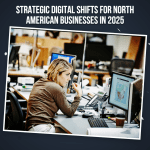The global marketing landscape has undergone a substantial shift in recent years, and the growing role of artificial intelligence in campaign management is no longer speculative. It is definitive. Over 40 percent of marketers are now actively incorporating AI into their workflows, primarily to drive personalization and performance measurement. This development is not isolated to large corporations. Small and medium-sized businesses in North America must now confront a pivotal truth: data-driven marketing is not an optional upgrade. It is an operational imperative.
Artificial intelligence is not just changing how campaigns are delivered. It is redefining what marketing success looks like. This article explores the current trajectory of AI integration within marketing and outlines how small businesses can participate meaningfully in this evolution through practical tools and informed strategies.
The strategic role of artificial intelligence in marketing
AI has transitioned from being a niche capability to becoming central in campaign execution and evaluation. Businesses are now using AI to perform real-time data analysis, generate predictive insights, automate content delivery, and assess customer sentiment across multiple channels.
Some of the most impactful applications include:
- Behavioral targeting: AI enables marketers to build dynamic audience segments based on real-time user actions and preferences.
- Predictive analytics: Data models anticipate future customer behavior, allowing for proactive campaign adjustments.
- Content optimization: Algorithms assess engagement metrics and recommend high-performing variations of ad copy, email templates, and landing pages.
- Sentiment analysis: Natural language processing tools interpret the tone and emotional context of customer interactions, offering deeper insight into brand perception.
This technological foundation enables a degree of precision and responsiveness that traditional marketing tools cannot replicate. For CMOs and marketing leads, AI is not simply a tool. It is a strategic advisor.
The competitive imperative for small and medium businesses
Historically, AI-driven tools were the domain of large organizations with substantial resources. That gap has now closed. Many modern AI platforms are built specifically to serve small teams, offering intuitive interfaces and affordable pricing models.
The implications for small business competitiveness are substantial:
- Operational efficiency: Repetitive marketing tasks such as A/B testing, scheduling, and report generation can be automated, freeing up staff for higher-value work.
- Improved return on investment: Marketing budgets can be allocated based on real-time insights, increasing the effectiveness of each campaign dollar.
- Customer intimacy: Data segmentation allows businesses to deliver messaging that is timely, relevant, and personally resonant.
- Scalability: AI tools are designed to grow with the business, meaning small teams can maintain performance even as their campaigns expand in complexity.
With these tools, smaller firms are no longer at a disadvantage. They are fully equipped to challenge larger competitors, provided they adopt a strategic mindset.
Entry-level tools that offer immediate value
For organizations new to AI-driven marketing, the first steps need not be overwhelming. Two of the most accessible and effective tools are A/B testing and heatmaps. Each offers immediate value with minimal technical investment.
A/B Testing
A/B testing remains one of the most reliable methods for improving marketing performance through incremental adjustments. By testing two variations of a given element-such as an email subject line or call-to-action button-businesses can identify which version drives better results.
- Cost efficiency: Many platforms offer testing functionality on a pay-as-you-go basis or as part of standard service tiers.
- Actionable data: Results provide clear direction for improving user experience and increasing conversion rates.
- Short feedback loops: Campaigns can be optimized within days, not weeks.
This data-driven refinement process empowers businesses to move away from assumptions and operate based on measured outcomes.
Heatmaps
Heatmaps visually display how users interact with web pages, showing areas of high activity and user drop-off. These insights are particularly valuable in identifying points of friction in the customer journey.
- Visual clarity: Heatmaps provide an intuitive understanding of user behavior, even for non-technical stakeholders.
- Targeted improvements: Layout adjustments and content repositioning can be made based on user attention patterns.
- Conversion enhancement: Focused improvements lead to smoother navigation and increased action rates.
Together, these tools form a foundation for data-driven decision-making that is both accessible and powerful.
AI tools tailored for small business use
Several platforms have emerged as leaders in offering AI functionality that balances sophistication with usability. These tools are especially relevant to North American SMBs seeking to upgrade their marketing infrastructure without overextending their internal resources.
| Tool | Primary Function | Key Benefit for SMBs |
| HubSpot AI Hub | Campaign automation and analytics | Streamlined workflows and insights |
| Microsoft 365 Copilot | Content creation and data review | Time savings and strategic clarity |
| Google Workspace AI | Email drafting and content research | Enhanced productivity |
| Compose A/B Testing | Website optimization | Fast iteration with low overhead |
These platforms support marketing teams in executing smarter campaigns and reacting to market signals more efficiently.
Adapting marketing strategy to the new norm
The transition to AI-powered marketing does not imply abandoning foundational marketing principles. Instead, it requires reorienting those principles within a data-centric framework. The role of leadership is to ensure that AI is implemented not as a novelty, but as a fully integrated component of the broader marketing strategy.
Key considerations include:
- Governance: Establish clear protocols for data use, AI tool selection, and campaign evaluation.
- Training: Invest in developing internal competency, particularly in interpreting analytics and leveraging platform features.
- Alignment: Ensure that AI-driven insights align with brand messaging, audience needs, and business objectives.
- Continuous improvement: Treat AI as a dynamic toolset that evolves alongside the business and its market.
Conclusion
The data is unequivocal. Over 40 percent of marketers are already using AI to personalize and measure campaigns, and the number continues to grow. For small and medium-sized businesses across Canada and the United States, the path forward involves embracing accessible AI tools, embedding them into everyday operations, and using data to inform every marketing decision.
AI is no longer a differentiator. It is a baseline expectation. Businesses that fail to evolve risk falling behind, not just in reach and engagement, but in relevance. By adopting proven, scalable tools like A/B testing and heatmaps, SMBs can begin their transition with confidence and clarity, knowing that the most effective marketing strategies today are those built on actionable data and intelligent automation.









